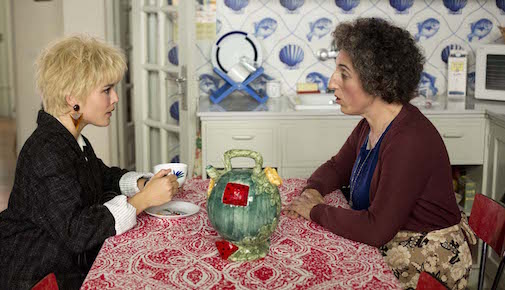Manuel here catching up with Pedro's latest at the New York Film Festival

Following the New York Film Festival screening of his 20th film, Pedro Almodóvar admitted that, in adapting Alice Munro’s short stories (from her collection, Runaway), he had aimed for a more restrained tone. Indeed, especially in comparison to his previous outing—the mile high club comedy I’m So Excited!—Julieta is an aggressively austere affair. Of course, “austere Almodóvar” is still inimitably Almodóvar. Take the film’s first shot: we’re awash in a sea of red fabric. It looks like draperie, perhaps a bedsheet or even a curtain. It pulses like a heart...
As it turns out, what we’re seeing is Julieta’s bold red dress, its heaving a sign of her breathing. She’s packing up her sleek Madrid apartment, preparing for a move to Portugal with her boyfriend. Only, after a chance encounter with an old friend of her daughter’s, Julieta (played at this age by Emma Suárez), decides to stay in town, end her relationship with her understanding partner, and move back to the building where she once lived. There, she begins writing her estranged daughter a letter of sorts that explains everything she couldn’t say while they were still in touch and living in that very building. This plunges us to a series of flashbacks where we meet a younger Julieta (played by Adriana Ugarte) who sports a punk mod style as she meets, as if by chance, a charming fisherman with whom she has a torrid one night affair on a train.
Building a story out of silence and grief, you can see why Almodóvar opted for austerity, hoping to do justice to Munro’s work: Juliet, she tells us in her first story, “might have had, at some level, the idea of herself as a young woman in a Russian novel, going out into an unfamiliar, terrifying, and exhilarating landscape where the wolves would howl at night and where she would meet her fae. She did not care that this fate—in a Russian novel—would likely turn out to be dreary, or tragic, or both.” The more we learn about Julieta's life, as she reveals it to herself as she does to us, it becomes clear that she was right. Though here the tragedy is much more contained and begins rather than ends with a train.

As with previous Almodóvar features like The Skin I Live In and Broken Embraces, the film shuttles back and forth between past and present to trace how it is that the vibrant, mini-skirt and blue-stocking wearing young woman in that train became the muted, near-broken woman we find wandering the streets of Madrid in the present. The Spanish director has once again created a plot so intricately constructed that any attempt to summarize it will only do it a disservice. Suffice to say that its original title, Silence, speaks to the words unsaid between mother and daughter but also between Julieta and two men in her life, whose deaths haunt her for years to come.
Try as he might to tame his more flamboyant side, the flashes of Almodovarian color, both figural and literal, are what make Julieta such a return to form for the beloved director. Deploying a mostly primary colors-palette (young Julieta is garbed in blues, the older one in reds, both popping against her bright blond locks), a gorgeously robust Alberto Iglesias score, and the types of beautifully art directed shots that feel indulgent as well as necessary (oh to live in any of the living spaces we're shown here), Julieta is as sober a Pedro melodrama as we’ve gotten in decades. Who knew he'd wear restraint so well?

Julieta is Spain's Oscar submission for 2016. It open in select US theaters on December 21st